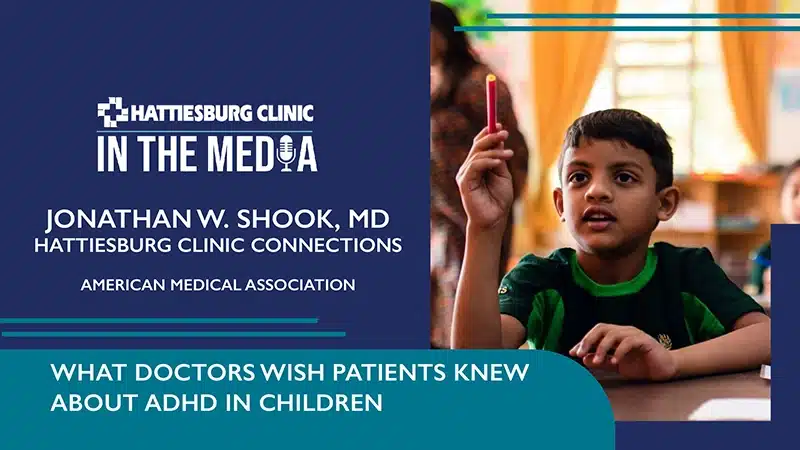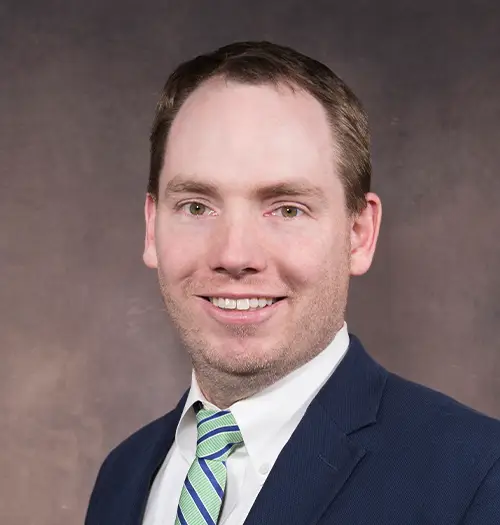Understanding ADHD: Shook Shares Insights with the AMA
In a recent interview with the American Medical Association (AMA), Jonathan W. Shook, MD, a pediatrician and medical director at Hattiesburg Clinic Connections, shared essential insights on attention-deficit/hyperactivity disorder (ADHD) in the AMA’s “What Doctors Wish Patients Knew™” series. Dr. Shook explained ADHD is a neurodevelopmental condition affecting children and adults, with varied symptoms across age groups. He highlighted that diagnosis relies on clinical assessment, as there are no definitive tests, and emphasized the role of genetics and environmental factors in its development.
Shook outlined ADHD’s impact on daily life — affecting focus, impulse control and social interactions — and discussed treatment strategies, including behavioral therapy, academic support and medication, tailored to different age groups. He stressed the importance of support from loved ones and noted that untreated ADHD can lead to serious consequences, making timely treatment vital for improving quality of life.
What is ADHD?
“ADHD is a neurodevelopmental condition that has many risk factors or contributing factors that can affect individuals at different times in life in different ways,” explained Shook. Although traditionally thought of as a condition affecting children, ADHD is increasingly recognized in adults as well, with symptoms that can include inattentiveness, impulsivity and difficulty in organizing or managing time.
ADHD in Children and Adults
ADHD symptoms manifest differently in children and adults. In children, hyperactivity and impulsive behaviors are common, such as difficulty sitting still, interrupting conversations or trouble staying quiet. As children mature into teens and adults, symptoms may shift to more internal challenges, like trouble focusing, organizing tasks and managing time.
In children, boys are more frequently diagnosed, whereas in adults, ADHD prevalence is similar between genders. Shook noted that the ratio “becomes closer to one-to-one as we go up the lifespan into adulthood.”
How ADHD is Diagnosed
Unlike some medical conditions, ADHD is diagnosed through clinical assessments rather than a definitive test. Diagnosis involves gathering information from the individual, family members, teachers or colleagues to establish a pattern of symptoms lasting over six months and affecting daily functioning. Shook emphasized that ruling out other medical or psychological conditions is essential to an accurate diagnosis.
The Genetic and Environmental Factors of ADHD
Research has shown that ADHD has a strong genetic component, often clustering within families. While no single gene causes ADHD, it appears to be influenced by multiple genetic factors. Additionally, environmental factors—such as prenatal conditions and certain stressors—can increase the risk of ADHD symptoms or severity. “Children with ADHD who grow up in challenging environments may experience an intensification of symptoms,” Shook said, underscoring how both genetics and life experiences impact the condition.
Impact of ADHD on Daily Life
For those with ADHD, daily life can present unique challenges. Children with ADHD may struggle with attention in class, making careless mistakes or facing social difficulties due to impulsivity, which can impact friendships and self-esteem. Adults with ADHD often find managing tasks, time and organization difficult, which may lead to stress and affect work performance.
Untreated ADHD can also lead to a higher risk of complications, including car accidents, job loss, school dropout and coexisting conditions like anxiety and depression. As Shook stated, “Untreated ADHD increases the risk of lots of negative outcomes, so treating ADHD can decrease those risks and improve life quality for those affected.”
ADHD Treatment Options
Shook categorized ADHD treatment into three main approaches: behavioral, academic and medical.
- Behavioral Therapy: This is especially beneficial for younger children, where techniques like parent behavior management training can equip parents with skills to support their child’s development. Adolescents benefit from skills-based therapy that helps improve time management and organizational skills.
- Academic Support: Schools play a significant role by offering accommodations such as extra test time or quiet spaces for exams. Shook advised parents to work with school officials to tailor academic interventions that support their child’s unique needs.
- Medication: For children aged six and older, combining medication with behavioral strategies can be effective. Stimulant and non-stimulant medications are available, and Shook recommended working closely with medical providers to assess the benefits and manage any side effects, such as appetite changes or sleep difficulties.
The Role of Support and Understanding
Families and friends play an important role in the support of individuals with ADHD. Educating loved ones about ADHD can reduce stigma and foster a more supportive environment. Shook encouraged families to be “understanding and forgiving,” noting that simple gestures like reminders or creating structured routines can significantly help a loved one manage ADHD symptoms effectively.
Seeking Treatment and Moving Forward
ADHD is often misunderstood, but with proper support and a comprehensive treatment plan, individuals with ADHD can lead fulfilling lives. For parents and individuals seeking help, consulting with a medical professional is the first step toward managing ADHD effectively. Shook emphasized the importance of early intervention, personalized treatment and ongoing support for those affected by ADHD.
Read the full article to learn more from Dr. Shook: What doctors wish patients knew about ADHD in children.
###
About Hattiesburg Clinic Connections:
Hattiesburg Clinic Connections serves as a regional resource center for children, adolescents and adults who struggle with learning, attention problems, behavioral concerns or emotional difficulties. The team at Connections uses evidence informed guidelines as well as standard of care practices to help improve the lives of people with conditions such as attention deficit hyperactivity disorder (ADHD), dyslexia, anxiety, depression, oppositional defiant disorder (ODD) and autism spectrum disorder.
About Hattiesburg Clinic:
Hattiesburg Clinic is Mississippi’s largest privately-owned, multispecialty clinic. More than 60 years after its beginning, the clinic has grown to over 450 physicians and providers, caring for patients in more than 17 counties in South Mississippi. Along with over 2,500 professional staff employees, these physicians and providers come together for a common purpose, to serve the over 500,000 community members who live and work in South Mississippi every day.

